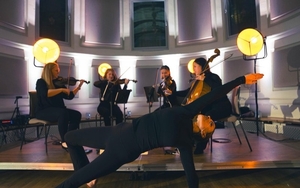THIS was very much a concert of two halves. The first had two pieces written within the last four years, the second two of the most popular pieces of the twentieth century. For me the unexpected highlight was Sir James MacMillan’s Viola Concerto. Written in 2013 and here performed by its dedicatee, Lawrence Power, his was a gripping and yes, a virtuoso performance. The concerto is surprisingly traditional, with three distinct movements and Power played for approximately thirty of the thirty-one minutes. By the end the drive and sheer likeability of the piece would suggest that it is going straight into the viola repertoire.
Of course, the loudest applause was reserved for Rhapsody in Blue
There were many moments of surprise and beauty, especially in the second and third sections. Power in the former played a long lyrical line that weaved in and out of whistling, singing, jigging and at one point seemed to evoke a rather woozy intoxication: He was stunning. In the final section, with a Japanese-style flute attended by duos of viola and cello, the control and emotion of both orchestra and soloist were most affecting.
Each movement was grounded by the percussion, with a different timbre provided by a marimba or xylophone or glockenspiel – the timbre rose with with each movement. I asked my orchestra-literate friend what each instrument was called (it was difficult to see them) and he explained after some thought: ‘I don’t know the minor differences between the … the hitty things.’ I will have to find out. But both of us felt that the Viola Concerto sounded like a major composition. The audience clapped after the first movement, not because the piece had galvanised them – at the end their applause was a little underpowered – but because it was unfamiliar. Power, and the BBC Phil, this time under the control of the willowy Nicholas Collon (pictured), deserved a lot more.
Of course, the loudest applause was reserved for Rhapsody in Blue. In contrast to the MacMillan, I’ve heard Gershwin’s jazzy quarter of an hour a few times in concert halls. It was expertly played, right from the off, with the evocative climbing clarinet being abruptly started by a sort of ‘come on then’ gesture from Collon. On through the cityscape honks and the cross-handed piano, Jonathan Scott was a clean and efficient soloist, but in some ways I prefer a bluesier, blousier take.
The first and last compositions were Mark Simpson’s sparks and Stravinsky’s The Firebird – suite (the 1945 version). sparks (it is lower case) was written as the opener for the Last Night of the Proms in 2012, and is three minutes of entertaining racket. From the high scraping strings that lead off, which then scrape higher almost immediately, the thumping drums, squawking brass and lots of percussive bangs, followed by a sudden respite of woodwind, like the air sucked out in a vacuum, then a hurtling race to the climax. Great fun.
Stravinsky’s suite, based on his music for Diaghilev’s ballet based on a Russian legend, originally written 30+ years earlier, showcased the orchestra’s extraordinarily good run of form at the moment. The sombre opening with a dark bassoon was compelling, the piano’s frequent silvery interjections had an uncanny charm and in the mid-point, some ‘sugary-plum’ strings and an aching French horn were arresting. The flutes and oboes and the harp had a good night, especially in the ninth of the ten movements as the music simply fluttered into silence. Another imaginatively programmed and superbly played concert: catch them while they are in such a run of form.
The BBC Philharmonic next play the Bridgewater Hall on Sunday 28 February - tickets available at bridgewater-hall.co.uk














